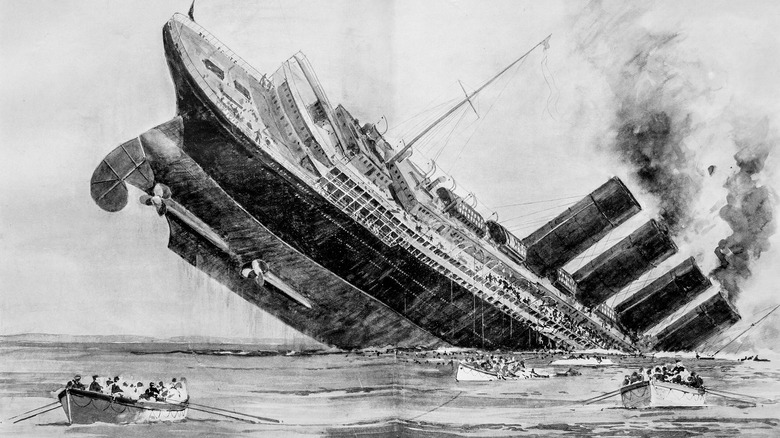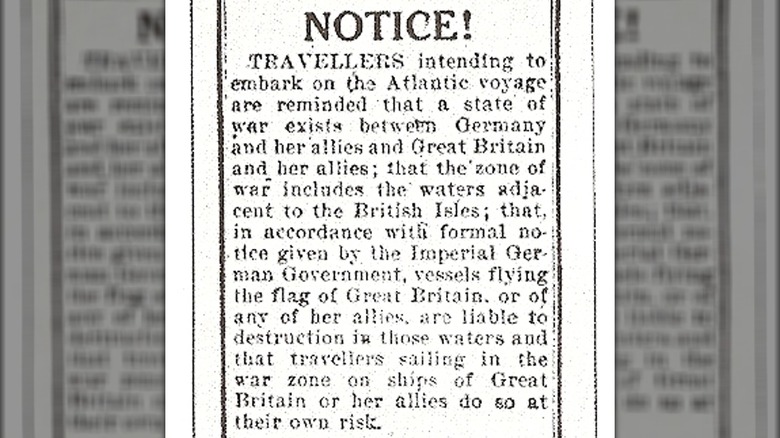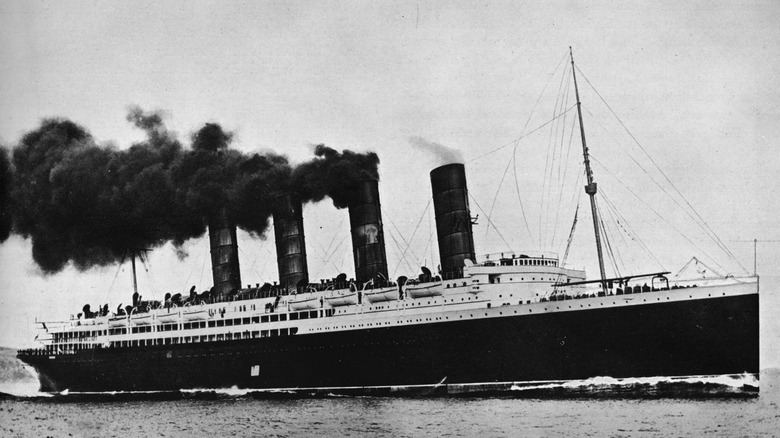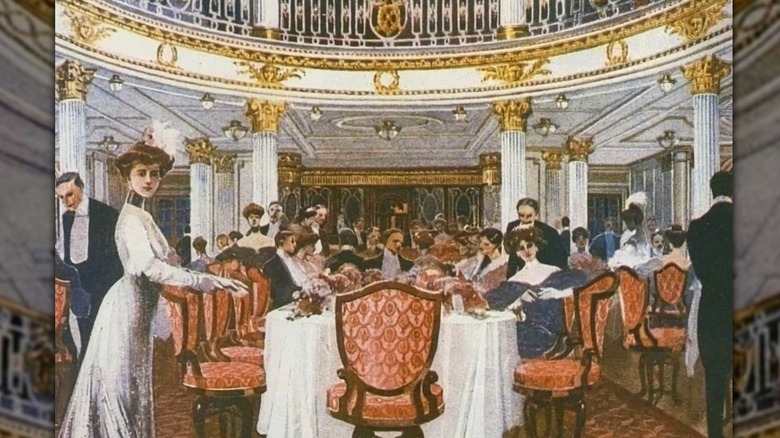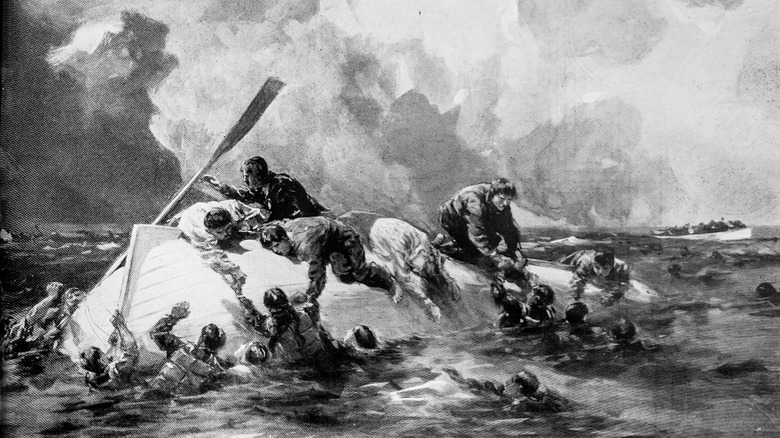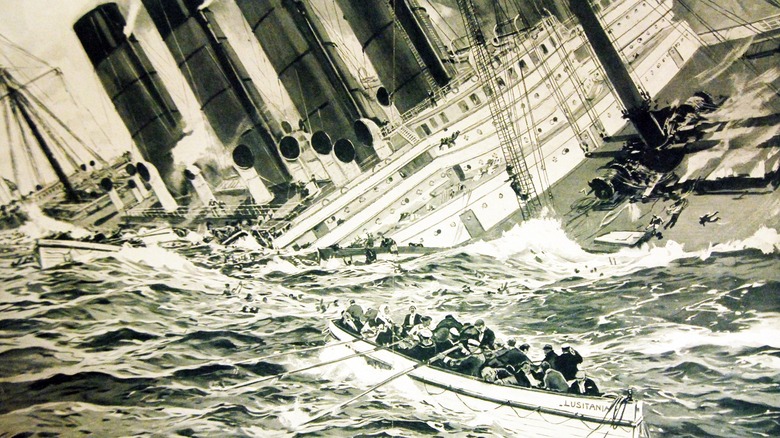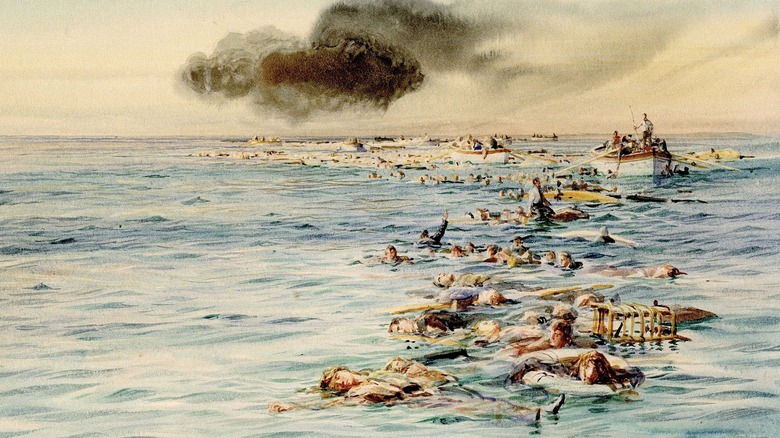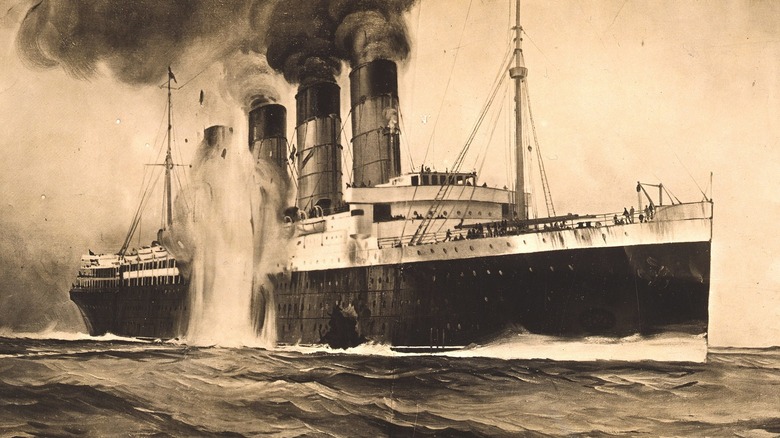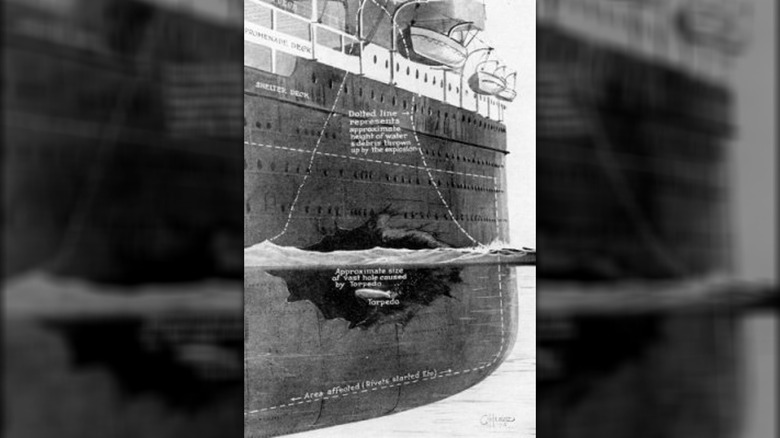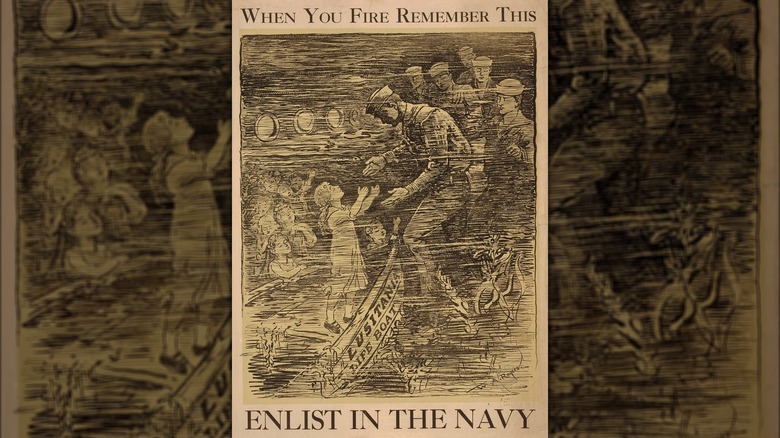The Tragic Story Of The Sinking Of The Lusitania
Determining the root causes of World War I is a pretty confusing thing to do. To put it lightly, there were a lot of factors at play in the early 20th century, ranging from a complex network of international relations to equally complicated domestic tensions. And that's not even accounting for a certain assassination of a certain archduke. But even after the war started, the politics didn't get any simpler. After all, the United States didn't immediately join the war, and President Woodrow Wilson preached neutrality. But a quick look at the history books can tell you that neutrality didn't exactly last long. As for why? Well, one of the reasons people will point to is the sinking of the Lusitania.
One of the largest and fastest ships of its time, the Lusitania undertook a journey from New York City to Liverpool in May 1915 with nearly 2,000 people on board. But on May 7, as it entered British waters, the Lusitania was hit by a torpedo launched by a German submarine. The ship sank in under 20 minutes, and over half of the total passengers — nearly 1,200 people — were killed in the tragedy, over 100 of whom were American citizens. The act of violence sparked both outrage and grief, arguably changing the course of history as a result.
The Lusitania knowingly walked into danger
That the Lusitania was targeted despite being a civilian ship is the kind of detail that really paints Germany as the villain. However, in actuality, the details of the situation were a bit more complicated than that.
As World War I continued, German U-boats in British waters adopted a policy known as "prize rules." In short, they would surface, search the ship, and then destroy it after giving the crew time to evacuate. But when Britain began using heavily armed mercantile ships as a way to try and counter the threat to their supply routes, German U-boats turned to unrestricted submarine warfare. The hazards in British waters had been a known factor since the early part of 1915, and this was the situation that faced the Lusitania.
But there was more than the vague notion of danger around the British Isles. On the contrary, the German embassy eventually took to actively warning the American public against traveling to Britain; granted, the warnings might have been more about psychological warfare than benevolence, but regardless, the risks weren't a secret. After all, those warnings were even published in newspapers, and in a darkly ironic twist, they were occasionally published right next to advertisements for the Lusitania's doomed voyage.
Decisions about the ship's journey made it an easy target
At the time of its final voyage, the Lusitania was being used as a commercial vehicle, taking civilians on a trip from the U.S. to Britain — that much is true. But it was a bit more than just your average cruise ship. Rather, the ship was originally designed with the intention of being easily converted into a warship, should the need arise. In other words, the Lusitania was actually well suited to evade and avoid German submarines. While operating at full power, it should have been able to easily outrun a U-boat; even while operating at slightly lower speeds in order to increase fuel economy, speed shouldn't have been a problem, at least when it came to the ship's capabilities.
But that doesn't account for the human factor. As the Lusitania approached the shores of the United Kingdom, the weather conditions were less than ideal, and so the captain of the ship decided to take a gamble and time their arrival with a higher tide to pull into the channel. The order was made to slow the ship's speed, turning the ship into a sitting duck for the submarines known to operate in the area.
Apparent ignorance of their perilous situation by the captain went further still; ship captains at the time knew that they should take a zigzagging course, as a precaution against submarines predicting their route for a torpedo attack. But in this case, the captain decided to forego that tactic, and instead slowly sail straight ahead.
The day seemed perfectly normal
Though the signs pointing toward danger and tragedy seem like they should have been perfectly clear, a look at the lives of the Lusitania's passengers paints a very different picture. Contrary to what might be expected of a passenger ship passing through an active warzone, reports from the trip sound rather pleasant. In the eyes of the passengers, there was no way that they would ever be considered targets by German submarines. In fact, the entire concept was treated as something of a joke.
Laughs were traded about just how dangerous these submarines could even be, and passengers spent their days in exactly the way you would expect of those on a cruise ship: eating, drinking, playing games, and making new friends with their newfound neighbors. There was no sign of fear for much of the trip, and few precautions — if any — were taken to disguise the Lusitania's passage across the Atlantic. Lights were not darkened, which would have made the ship perfectly visible to anyone else on the ocean, and that actually reinforced the ease of the passengers. After all, they had every reason to believe the crew would be acting with caution if the danger was real.
Granted, there was some level of anxiety that arose as the ship crossed into British waters, but for the most part, even as the torpedoes struck the ship, passengers were going about their days as usual.
Lifeboats couldn't save the passengers
As you would expect of a large ship carrying thousands of passengers on a transatlantic journey, the Lusitania was outfitted with plenty of lifeboats: 48 of them, to be a bit more exact, which should have been enough to save more than 2,600 people. However, only six of them were successfully deployed.
The captain of the U-boat that attacked the Lusitania, Walther Schweiger, was watching as the evacuation all went wrong, and recorded it in his log. From his point of view, in the face of terror and panic a bunch of the ship's lifeboats were lowered into the water, despite being entirely empty. As a result, the passengers were forced to jump down into the lifeboats, rather than just boarding them normally; this desperate act only upset the lifeboats and caused them to take on water. His observations were further supported by later examinations of the ship's lifeboat systems. It was apparently faulty, and the explosion only further damaged the machinery. Compounding all this was the delay in launching the lifeboats, as the ship needed to slow to a safe speed to do so; by that time, the Lusitania had developed a severe list, and in the end, the boats could only be launched from one side of the ship.
But even for those who successfully made it into the boats, the danger wasn't over. In at least one documented case, the lifeboat itself was damaged and leaking water, leaving survivors to try and bail out water faster than it could seep in. And all of that was after narrowly avoiding being crushed by the rapidly sinking ship they had just escaped.
Some victims were sucked into the water
There's something of a controversial effect brought up in the telling of tales of large ships sinking that's become an odd point of contention: the suction — or vortex-like effect — that a large, sinking vehicle could cause on the water around it. While there seem to be instances of that whirlpool managing even to sink other smaller, nearby ships, there's some debate as to whether survivors of the Titanic ever experienced such a thing.
Nonetheless, survivor accounts from the Lusitania make mention of a very similar effect, and it's quite a harrowing description in each case. One of the passengers, George Scott, explained that he was already in the water when the Lusitania actually dipped beneath the waves, but that when it did, he was pulled underneath with it. From there, time became something of a blur, and for understandable reason; he didn't know exactly what had happened, the panic had made it feel as if he'd been trapped underwater for an hour. And in a similar tale, Robert Timmis recalled that, as the Lusitania sank, he and other passengers were dragged down into the depths at the same time. By his estimations, he'd been pulled down somewhere around 60 feet.
Victims were stuck in the water for hours
The actual moment that the torpedo struck the side of the Lusitania was, by all witness accounts, a terrifying moment on its own: a loud explosion, debris flung into the air, and the eruption of chaos as passengers tried to figure out what was going on. The nearly 20 minutes to follow — as the ship listed to the side and passengers and crew members alike tried to rush to safety — were certainly no less terrifying. But the horrors were hardly over at that point.
Those who weren't killed in the explosion and managed to make it into the water weren't free from danger by any means. They managed to reach the surface, in many cases surrounded by a mix of debris and corpses, some of which had been left bloody — victims of the violent explosion. But owing to the fact that so few of the lifeboats were operational, some of the victims could do little more than cling to the debris that floated around them.
For a lucky few, one of the scarce surviving lifeboats would pass by and pick them up, saving them from the water. But in other cases, they were forced to wait in the water for well over an hour, and not everyone was able to survive that. Drowning and the explosion killed many, but long-term exposure was the cause of death for quite a few more.
Some barely escaped death
Given the panic, destruction, and the tragic loss of life that occurred on that fateful day, all the survivors of the sinking of the Lusitania had experienced, at the very least, a brush with death. But for a few of them, their demise loomed even closer.
Nettie Moore was one of a small number of passengers who actually managed to make it to a lifeboat that made it into the water below, but unfortunately, the lifeboats hardly guaranteed survival. Such was the case for Moore; the lifeboat sank, and both Moore's child and husband died as they awaited rescue. But as for Moore herself? She remembered being taken from the water, roughly dragged to be piled with the rest of the recovered bodies, and believed dead. A stroke of luck saved her, as her brother happened to see her eyelids move, and she was revived.
Theodate Pope experienced something very similar. Though she was given a lifejacket, she felt herself pulled deep underwater after jumping from the sinking ship into the water. She surfaced to a scene filled with chaos and panic, but after grabbing onto an oar, she fell unconscious; rescuers assumed she was dead, as she was placed alongside the dead. Fortunately, a friend she had made during the journey happened upon her and realized that she was alive — Pope woke up a couple of hours later.
The Lusitania managed to send out an SOS
Though some of the crewmembers of the Lusitania decided to flaunt protocol — one such individual reportedly cried out, "Passengers be damned: save yourself first" (via National Archives Foundation) — not all members of the crew were quite so inclined. In fact, the chief electrician aboard the ship technically wasn't on the clock at the time when the torpedo struck the side of the Lusitania, yet rushed to keep electricity running just long enough for other crew members to send out a single SOS message, hoping that other ships would come to their aid.
However, not only was it generally known that German submarines were patrolling around in British waters, but the British Admiralty knew some very specific details. A number of U-boats were operating in the general area that the Lusitania was traversing, and the specific submarine that ended up sinking the doomed ship had already sunk a number of other ships in the past week alone. These were dangerous waters.
And because of that, the Lusitania's SOS fell on deaf ears. Multiple ships were in the area at the time, and picked up the message, but it went unanswered; any attempt at a rescue was deemed to be far too risky.
No one actually knows why the ship sank
Despite all that's known about the Lusitania, it has been hard for historians to actually pin down exactly what happened when the ship sank. After all, the torpedo struck the side of the Lusitania and caused an explosion, but after a handful of moments passed, a second explosion also tore through the ship.
But the reason for that explosion — and the extent of the damage it caused — is one that no one fully agreed on. Some would argue that it was the first explosion, the initial blast caused by the torpedo, that doomed the ship. Other reports gave a bit more claim to the second explosion, citing it as being the larger of the two, at times accompanied by the explanation that it was caused by an erupting boiler.
There's another school of thought, however. At the time, it was already known that the British Admiralty was disguising warships as mercantile vessels, and speculation eventually arose that the Lusitania was carrying more than civilian passengers; it might have been carrying ammunition and war supplies. And there appears to be truth in that. Searches of the wreckage, as well as secret documents, have since uncovered millions of rounds of ammunition, presumably being shipped from the U.S. for use in the war. Given the fact that war supplies were, in fact, on board the Lusitania, it only followed that some would speculate the second explosion as having originated from this secret stash of weapons.
[Featured image by Mary Evans Picture Library via Wikimedia Commons | Cropped and scaled | CC BY-SA 3.0]
American responses and entry into World War I
The tragic sinking of the Lusitania set off a chain reaction of emotional responses related to World War I. The British painted it as one of Germany's "crimes against God and man" (via IWM) — proof of German cruelty and barbarism (and reason for people to enlist in the war effort). But the American response was no less heated, despite the U.S. itself being technically still neutral at the time.
The U.S. ambassador in Britain explained it succinctly: "The freely expressed unofficial feeling is that the United States must declare war or forfeit European respect" (via History). Former president Theodore Roosevelt even made his feelings on the matter known as well, explicitly attacking Woodrow Wilson's stubborn choice to stick to neutrality. While Wilson called for an end to unrestricted submarine warfare, Roosevelt felt that it wasn't anywhere near enough; in fact, he actually claimed that Wilson's pacifism only led to growing apathy among the public.
In the short term, the U.S. didn't do much in response to the sinking of the Lusitania, government officials doing all they could to limit any responses in an attempt to keep the country as far from the war as possible. That said, when the U.S. did enter the war in 1917, unrestricted submarine warfare was cited as one of the reasons, and imagery of the Lusitania was actively used in American propaganda posters to further drum up support for the war effort.
